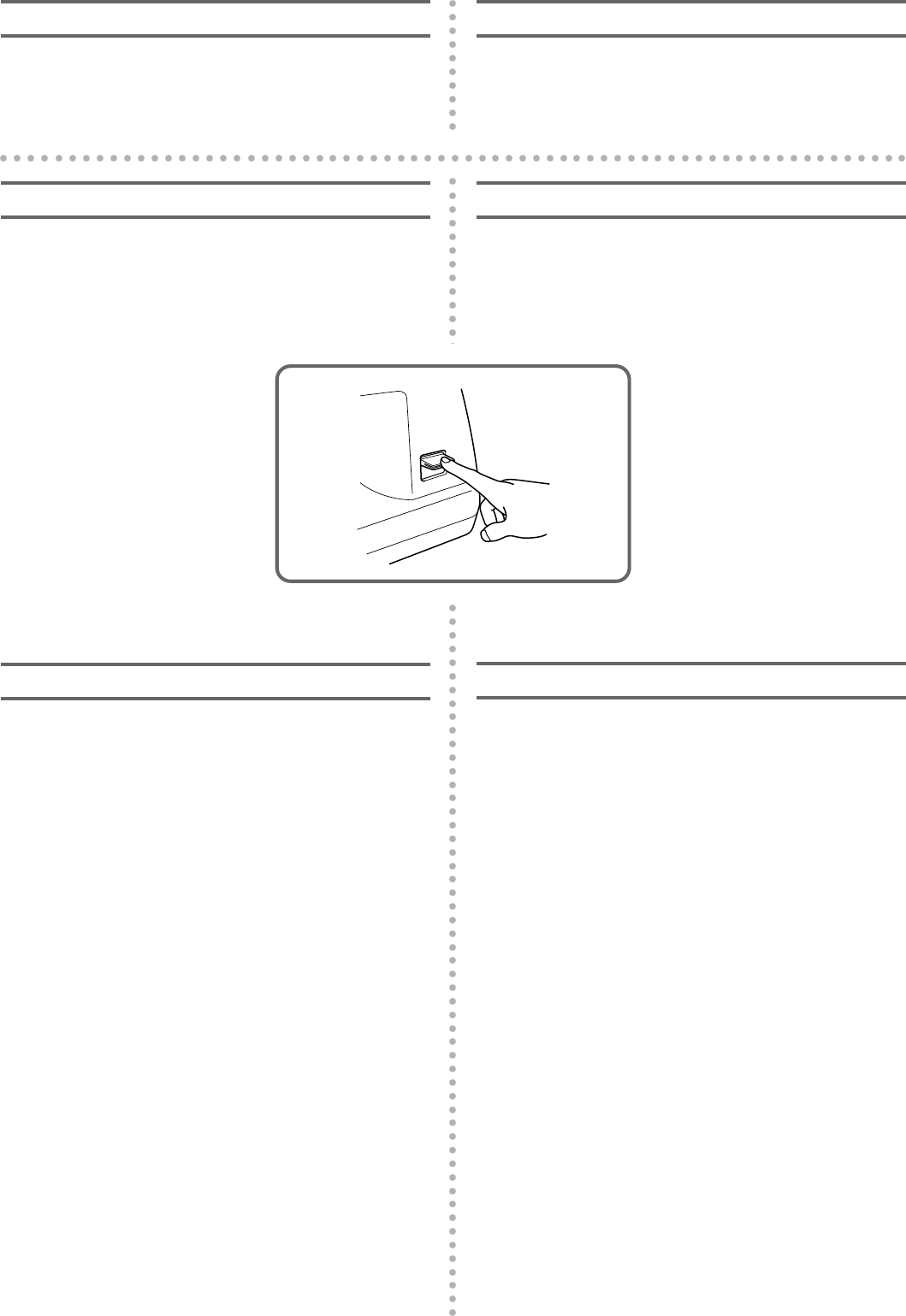
12
Reverse Sewing Lever
To sew in reverse, press down the reverse sewing lever as far as
possible and hold it in that position while lightly stepping on the
foot controller. To sew forward, release the reverse sewing lever.
Reverse sewing is used for locking and reinforcing seams.
Levier de couture en marche arrière
Pour coudre en arrière, abaisser au maximum le levier de couture
en marche arrière, et le maintenir dans cette position tout en ap-
puyant légèrement sur la pédale. Pour coudre à nouveau vers
l’avant, relâcher le levier. Utiliser la couture en marche arrière
pour arrêter ou renforcer une couture.
THREADING THE MACHINE
Winding the Bobbin
1. Place the spool of thread on the spool pin and pass the thread
around the bobbin winding tension disc.
1 Bobbin winding tension disc
2 Bobbin winding
2. Pass the end of the thread through the hole in the bobbin from
the inside.
3. Place the bobbin onto the bobbin winding shaft and slide the
shaft to the right. Turn the bobbin clockwise, by hand, until the
spring on the shaft slides into the slit on the bobbin.
3 Spring
4 Slit
4. While holding the end of the thread, gently depress the foot
controller to wind the thread around the bobbin a few times,
then stop the machine.
5. Trim the excess thread sticking out from the top of the bobbin
and continue winding the thread onto the bobbin by depress-
ing the foot controller.
NOTE:
The machine stops automatically when the bobbin is full.
6. When the machine stops, cut the thread, push the shaft to the
left and remove the full bobbin from the shaft.
CAUTION:
Although the needle bar does not move when the bobbin winding
shaft is slid toward the bobbin presser, the balance wheel will con-
tinue to turn. Therefore, do not touch the balance wheel while the
bobbin is being wound.
ENFILAGE DE LA MACHINE
Remplissage de la canette
1. Placer la bobine de fil sur le porte-bobine et faire passer le fil
par le disque de tension du dévidoir.
1
Disque de tension du dévidoir
2
Remplissage de la canette
2. Passer l’extrémité du fil dans l’orifice de la canette, par l’inté-
rieur.
3. Placer la canette sur le dévidoir et glisser celui-ci vers le droite.
Tourner la canette dans le sens des aiguilles d’une montre, à la
main, jusqu’à ce que le ressort de la broche se place dans la
rainure de la canette.
3
Ressort
4
Rainure
4. Tout en tenant l’extrémité du fil, appuyer doucement sur la
pédale pour enrouler le fil autour de la canette. Arrêter la ma-
chine au bout de quelques tours.
5. Couper le bout de fil dépassant au-dessus de la canette puis
continuer à enrouler le fil sur la canette en appuyant sur la
pédale du rhéostat.
REMARQUE:
La machine s’arrête automatiquement lorsque la canette est pleine.
6. Lorsque la machine s’arrête, couper le fil, repousser le dévidoir
vers la gauche, et en retirer la canette pleine.
PRECAUTION:
Bien que la barre à aiguille ne fonctionne pas lorsque la broche du
dévidoir est glissée pour maintenir la canette, le volant à main va
continuer à tourner. Dès lors, éviter de toucher le volant lors du
remplissage de la canette.
Rückwärtsnähen
Drücken Sie die Taste zum Rückwärtsnähen soweit wie möglich, halten
Sie sie gedrückt, und treten Sie dabei leicht auf das Fußpedal. Zum
Nähen in Vorwärtsrichtung lassen Sie die Taste zum Rückwärtsnähen
einfach los. Das Rückwärtsnähen wird allgemein zur Verstärkung und
zum Befestigen von Säumen benutzt.
Achteruitnaaiknop
Om de machine achteruit te laten naaien, houdt u de achteruitnaaiknop
zo ver mogelijk ingedrukt en drukt u het voetpedaal een klein stukje in.
Om weer vooruit te naaien moet u de knop loslaten. Achteruitnaaien
wordt gebruikt voor aan- en afhechten en ter versteviging van de na-
den.


















